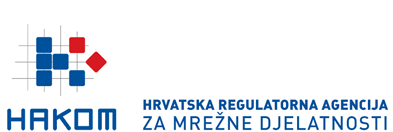Decision for LTE broadcasting signal interferencePRESS RELEASE
The procedure is simple for the citizens - if the interference preventing a good digital television signal occurs, it is necessary to report it to OiV (https://support.oiv.hr). If the interference is caused by the base station the operator should turn off the station until solving the problem.
For more information on the decision please contact the following link: UserDocsImages/2017/radiokomunikacije/Rjesenje-uklanjanje%20LTE%20smetnji-nakon%20javne%20rasprave-20170713.pdfZAGREB, August 8, 2017 - The Croatian Regulatory Authority for Network Industries (HAKOM) has issued decision regarding the removal of LTE interference for digital TV reception. The decision represents the final procedure of interference removal in case of digital TV reception interference caused by LTE base station. By means of switching to digital television in 2010 a part of the radio frequency spectrum (790-862 MHz) was allocated which was previously used only for TV and currently for mobile communications networks. Since the television receivers and antenna systems are adjusted in a way to receive signals from the entire frequency band 470-862 MHz, the operation of base station may cause the interference of TV reception to the end users. Since the new technologies were concerned, whose impact was possible to be predicted HAKOM issued a temporally solution for testing period in 2013 during which the interferences were solved in cooperation with the OiV network operator, mobile network operators and HAKOM. Apart from resolving the observed interferences, the objective was to define the optimal way of solving the interferences based on the gained. As a result of this process, a decision was made on 13 July this year. Pursuant to the decision the operator’s obligations were clearly established. HAKOM has been included in the entire process as a control. In case the users encounter interference received by digital terrestrial television suspecting that are caused by launching the LTE base stations, they must be reported to the Odašiljači veze d.o.o. (https://support.oiv.hr). OiV receives all interference reports of television viewers and then determines the potential cause of the interference (other causes other than base station influences are possible). In case the interference is caused by base station, the resolution is transferred to mobile network operators who are obliged to disconnect them until the interference is solved. # # # For additional information please contact: Croatian Regulatory Authority for Network Industries (HAKOM) Roberta Frangeša Mihanovića 9 10110 Zagreb, Croatia Tel. + 385 (0) 1 700 70 07 Fax + 385 (0)1 700 70 70 Media inquiries can be submitted online using HAKOM’s official website: Registration required.
ABOUT HAKOM: HAKOM (www.hakom.hr) - Croatian Regulatory Authority for Network Industries – ensures preconditions for a fair market competition, stable growth and environment for innovations in the electronic communications and postal services market. HAKOM protects users’ interests and the possibility of choice among various communications and postal services at affordable prices, defines sustainable competitive conditions for operators and service providers under fair conditions for return on investment, and provides support to economic growth, public services and the quality of life in the Republic of Croatia by using modern technologies. HAKOM’ strategic goals are: to promote regulation of the electronic communications and postal services market, to support growth of investments and innovations in the electronic communications and postal services market, to provide efficient use of limited resources, to accelerate the growth of broadband products and services, to provide affordable offers of communications and postal services, to provide protection and informing of users, to build an efficient and comprehensive information system, to define and implement efficient processes, and to acquire multi-disciplinary competencies in market regulation.
|
 |
|
|